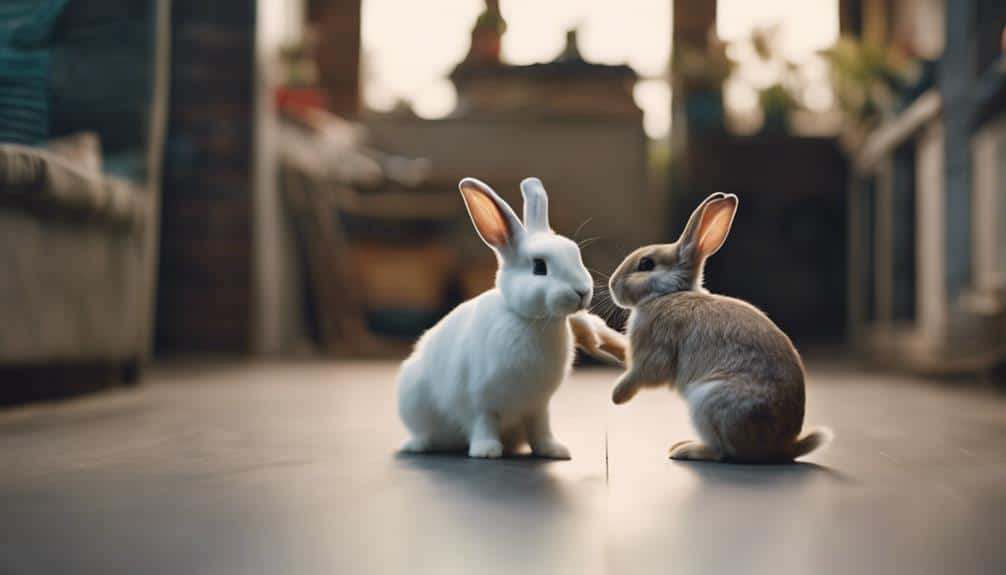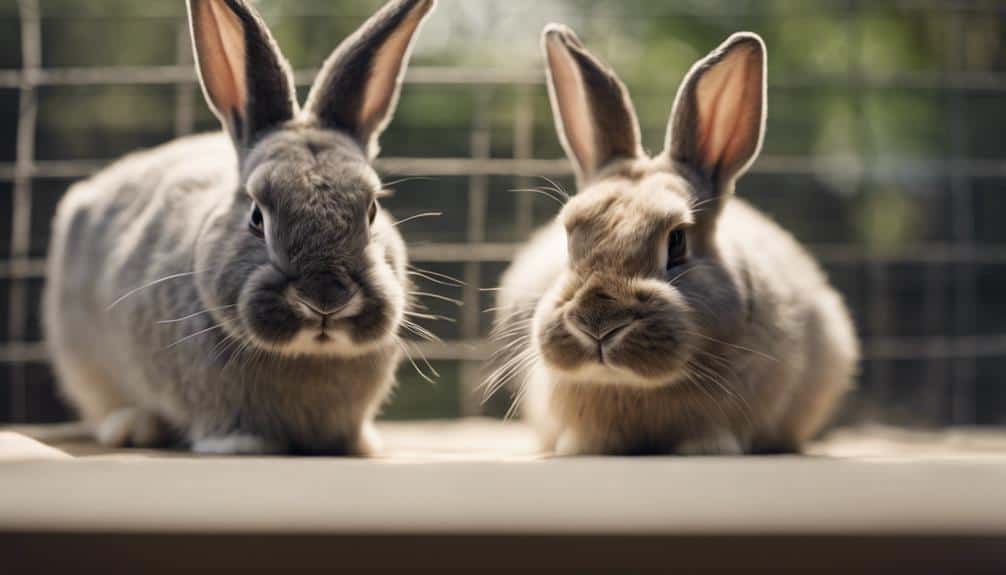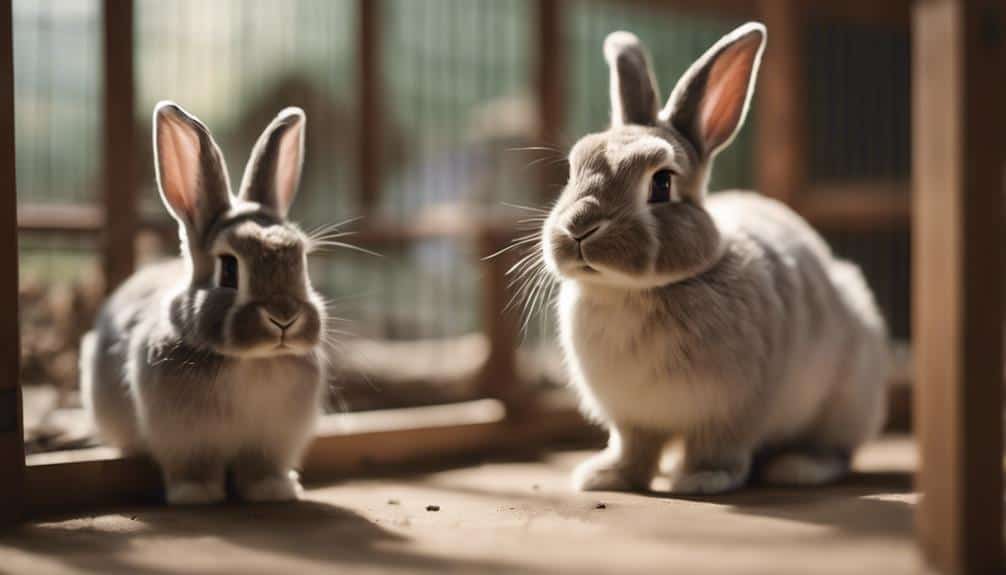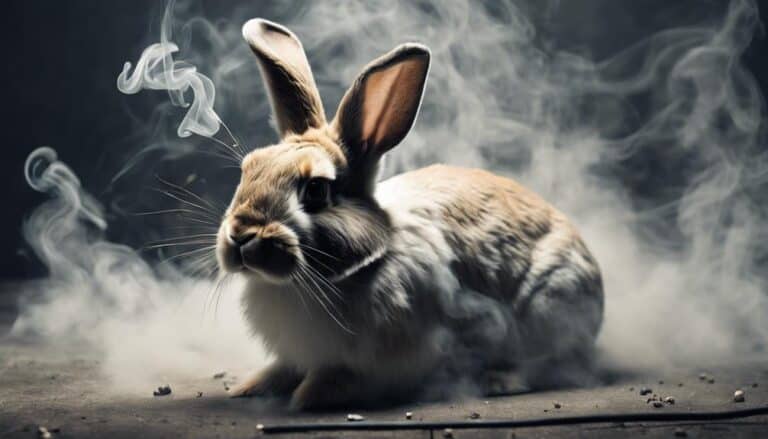So you're wondering if a neutered male bunny and an unneutered male bunny can get along?
The thing is, their relationship can be pretty complicated because of their different behaviors and hormone levels.
To make it work, you need to understand how to deal with these differences.
If you don't, things might not go so smoothly between the two rabbits.
Let's dive into the details of introducing and managing their relationship to make sure they live harmoniously together.
Contents
- 1 Key Takeaways
- 2 Neutered Vs. Unneutered Male Bunnies
- 3 Behavioral Risks in Unneutered Males
- 4 Importance of Neutering for Bonding
- 5 Health Benefits of Neutering
- 6 Challenges in Bonding Mixed Males
- 7 Neutering Process for Male Rabbits
- 8 Considerations Before Introducing Rabbits
- 9 Managing Aggression in Unneutered Males
- 10 Ensuring a Safe Bonding Process
- 11 Conclusion
Key Takeaways
So, you're wondering if a neutered male bunny and an unneutered male bunny can get along? Well, the thing is, it can be tough for them to bond because of their hormonal differences.
Unneutered males can get pretty aggressive towards neutered ones, which is something you'd want to avoid. To increase the chances of them getting along, you'll need to introduce them to each other very carefully in a neutral space.
It's super important to supervise and monitor their interactions closely, especially in the beginning. If things don't go well, you might need to separate them and start over.
One thing that can really help is neutering the unneutered male. This can greatly improve their chances of bonding and living together peacefully.
Neutered Vs. Unneutered Male Bunnies

So, when it comes to male bunnies, there's a big difference between those that are neutered and those that aren't.
A neutered male rabbit is one that's had a surgery to remove its reproductive organs. This can have some really great benefits, like reducing aggressive behavior, preventing unwanted breeding, and even improving how well they get along with other rabbits.
On the flip side, an unneutered male rabbit is one that hasn't had this surgery.
These guys are more likely to be territorial and aggressive, and they might even spray urine to mark their territory. They can also have a tough time bonding with other rabbits, especially males.
Plus, they're at risk for some serious health problems, like testicular cancer or infections related to their reproductive system.
Behavioral Risks in Unneutered Males
Unneutered male bunnies can be pretty aggressive towards other rabbits and even humans. This is because they've strong territorial instincts.
When they're not neutered, male rabbits can also exhibit hormonal mating behaviors. This means they might try to mount other rabbits or even people, which can make them difficult to handle.
Another issue with unneutered males is that they can develop territorial marking problems. They do this by spraying urine to mark their territory, which can lead to hygiene issues and unpleasant odors in your home.
Unneutered Male Aggression
Unneutered male rabbits can be pretty aggressive, and that's mainly due to their high testosterone levels.
This aggression often leads to fights with other males and sometimes even with humans.
When unneutered males aren't fixed, they tend to exhibit territorial behavior like urine spraying and mounting.
This can make it tough to manage their interactions with other rabbits.
These dominant males can also bully and stress out other rabbits around them.
Neutering is key to reducing aggression and territorial behavior in male rabbits.
By neutering them, you can significantly lower the risks of aggression, territorial behavior, and dominance issues.
This makes it easier to pair them with other rabbits and minimizes the likelihood of conflicts, stress, and fighting in their environment.
Hormonal Mating Behaviors
Neutering male rabbits is crucial to avoid the risks that come with hormonal mating behaviors. When they're not neutered, male bunnies can get pretty aggressive and territorial due to their hormones.
There are four key points to consider when it comes to hormonal mating behaviors in male rabbits.
They can get a bit excessive with the mounting behavior. This means they'll try to mount other rabbits, objects, or even humans because of their mating instincts.
Unneutered male rabbits can become more aggressive, especially when they're competing for a mate or defending their territory.
They might start spraying urine everywhere to mark their territory and attract potential mates. This, of course, leads to a pretty pungent smell in the living space.
The increased hormonal activity can cause destructive chewing behavior, which can damage furniture, wires, and other items in the environment.
Understanding these hormonal mating behaviors really drives home the importance of neutering to promote harmonious interactions between male bunnies and prevent unwanted behavioral issues.
Territorial Marking Issues
Territorial marking is a big issue with male rabbits. They can get really aggressive and fight over territory, even if one of them is neutered. This behavior is even worse when there's an unneutered male around, because it can trigger dominant behavior in neutered males and lead to fights.
Unneutered males are driven by their hormones and are more aggressive and territorial. This makes it hard to bond them with other rabbits. They might even try to mount other rabbits, including neutered males, which can cause a lot of stress and fighting.
Neutering is important to reduce aggressive behavior in male rabbits. It calms them down and makes it safer to bond them with other rabbits. If you're thinking of getting two male rabbits, it's highly recommended to neuter both of them. This will greatly reduce the risk of conflict and help them live together peacefully.
Importance of Neutering for Bonding
So, you're thinking of getting your male rabbits to live together in harmony? Well, neutering them is a crucial step in making that happen.
When male rabbits aren't neutered, they can be pretty aggressive and territorial, which makes it tough for them to get along.
By neutering your male bunnies, you can reduce all that aggression and territorial behavior.
It's like taking the competitiveness out of them, so they can focus on being friends instead of rivals.
Plus, neutering helps prevent some serious health issues, like testicular and prostate cancer.
Neutering for Bonding Success
So, you want to create a harmonious environment where multiple rabbits can live together peacefully.
The key to achieving this is neutering your male rabbits. Neutering is essential for successful bonding because it prevents unwanted breeding and reduces aggressive behaviors.
Neutering prevents unwanted breeding. When you neuter your male rabbits, you eliminate the risk of unplanned litters, which can cause conflicts between unneutered and spayed rabbits.
Neutering also reduces aggression in male rabbits. When they're not neutered, they can be territorial, aggressive, and even spray urine. Neutering helps curb these behaviors, making it easier for male rabbits to get along with each other.
Besides preventing unwanted breeding and reducing aggression, neutering has several health benefits for male rabbits. It can prevent certain cancers and contributes to their overall health and well-being, which means they'll live a better quality of life.
Neutering makes it easier to introduce rabbits to each other. When they're not neutered, they may fight for dominance, which can make bonding difficult. Neutering reduces the likelihood of these dominance struggles, making the bonding process much smoother.
Behavioral Benefits of Neutering
Neutering plays a huge role in helping male rabbits get along with each other. For one, it prevents unwanted breeding, which is a major obstacle to bonding between male rabbits.
When male rabbits aren't neutered, they can get pretty aggressive due to their hormones. This aggression makes it super tough to introduce them to other males.
But, neutering helps reduce this territorial behavior, allowing them to live peacefully with other rabbits.
Another perk of neutering is that it lowers the risk of testicular cancer in male rabbits. This is a big deal for their overall health and well-being.
Plus, neutering makes litter training way easier. Neutered males are less likely to spray urine or mark their territory, making the bonding process much smoother.
Health Benefits of Neutering
Neutering your male rabbit has several health benefits, one of the most significant being the reduction of testicular and prostate cancer risks. By neutering your male rabbit, you aren't only preventing unwanted breeding, but also promoting his overall well-being.
Neutering prevents testicular and prostate cancer, which are common in unneutered male rabbits. In fact, neutering eliminates the risk of testicular cancer, which is a common problem in intact male rabbits.
Behavioral issues are also significantly reduced when you neuter your male rabbit. Castration curbs territorial behavior, urine spraying, and aggression towards other rabbits, making your bunny more sociable and easier to bond with. You'll notice a significant change in your rabbit's behavior, making him a more enjoyable companion.
Neutering also reduces aggression in male rabbits. With lower hormone levels, your rabbit will be calmer and more peaceful. This creates a more harmonious environment for both you and your pet.
Neutering helps maintain your rabbit's overall health. It prevents fatal health issues such as testicular cancer and prostate problems, ensuring a healthier and longer life for your furry companion.
Challenges in Bonding Mixed Males

Bonding mixed male rabbits can be tricky, especially when you're trying to pair a neutered male with an unneutered one. The difference in hormones and dominance can cause conflicts. Unneutered males tend to be more aggressive and want to be in charge, which can make bonding difficult.
The presence of an intact male can trigger territorial behavior in a neutered male, leading to fights or tension between the two.
To overcome these challenges, you need to be patient and strategic in your approach. Start by introducing the rabbits in a neutral area, allowing them to get used to each other's scents and behaviors.
Make sure they've enough space, hiding spots, and resources, so they don't feel the need to compete. Keep a close eye on their interactions and step in if you notice any aggressive behavior.
Neutering Process for Male Rabbits
When thinking about neutering your male rabbit, it’s essential to know the right age for the procedure and its benefits. The optimal age for neutering is usually around 4 to 6 months, as this can help prevent unwanted behaviors and reduce the risk of certain health issues. Additionally, understanding the neutering surgery duration for bunnies is important for planning the procedure, which typically takes less than an hour. By addressing these factors, you can ensure a smooth experience for both you and your pet.
The ideal time to neuter your male rabbit is between 10-12 weeks old. This age range is recommended because it helps prevent certain behaviors and health issues that can arise later on.
Neutering your male rabbit does more than just prevent breeding and unwanted litters. It also stops urine spraying, territorial behavior, and reduces the risk of testicular and prostate cancer. These health benefits alone make neutering a worthwhile consideration.
In addition to the health benefits, neutering can also improve your rabbit's behavior. For one, it makes litter training easier. Neutering can also reduce aggression in male rabbits, making it a safer environment for bonding with other rabbits.
The neutering process itself involves surgically removing the testicles. To ensure your rabbit's comfort and safety, the procedure is usually performed under general anesthesia.
Considerations Before Introducing Rabbits

So, you want to introduce rabbits to each other? Before you do that, there are some important things to consider.
When you're introducing a neutered male and an unneutered male bunny, keep in mind that the unneutered male might get a bit territorial and aggressive towards the neutered male. It's a good idea to have both rabbits checked out by a vet to make sure they're healthy and to get some advice on the best way to introduce them.
You should also think about the age and temperament of each rabbit. This can affect how they interact with each other.
Make sure you provide plenty of space for the rabbits to retreat and hide if they need to during the introduction phase. It's crucial to keep a close eye on how they're getting along and be ready to separate them if things start to go south.
Managing Aggression in Unneutered Males
Managing aggression in unneutered males requires a strategic approach to guarantee the safety and well-being of all rabbits involved. These males can be pretty territorial and aggressive towards other male bunnies, especially when they're vying for dominance.
One major step to address this is neutering. Neutering the unneutered male bunny can substantially reduce aggressive tendencies and make it easier for them to get along with other rabbits.
Before introducing them to each other, it's best to house the unneutered male and the neutered male bunny in separate enclosures. This will prevent any potential conflicts and allow them to get accustomed to each other's presence.
When you do introduce them, supervise their interactions closely. You need to intervene in case of aggressive behavior and prevent any injuries.
Ensuring a Safe Bonding Process
When introducing a neutered male bunny to an unneutered male, it's crucial to prioritize gradual introductions and close supervision during interactions. This is because understanding rabbit behavior and potential challenges is key to a successful bonding process.
First, you'll need to create a neutral territory where both rabbits can meet for the first time. This space should be free of any one rabbit's scent to avoid triggering territorial behaviors. When they meet, observe their body language closely during the initial interactions. If you notice signs of aggression or fear, intervene immediately to prevent any potential harm. Additionally, provide plenty of hiding spots and enrichment to reduce stress during the bonding process.
To ensure a safe bonding process, follow these essential tips:
Gradual introductions are a must. Introduce the rabbits slowly in a neutral space. Close supervision is also crucial – monitor their interactions closely for any signs of aggression. Make sure the space is neutral, free of any rabbit's scent, to prevent territorial behaviors. Observe their body language closely, watching for signs of aggression or fear, and intervene if necessary. Finally, provide plenty of enrichment, like hiding spots and toys, to reduce stress during the bonding process.
Conclusion
So, you're wondering if a neutered male bunny and an unneutered male bunny can get along?
The short answer is yes, but it requires some effort and planning on your part.
First, let's talk about the risks. When you put two intact male bunnies together, they might fight due to their natural instinct to establish dominance. This can lead to injuries and stress. Neutering one or both of them can reduce aggression and territorial behavior, making them more likely to coexist peacefully.
That being said, introducing a neutered male and an unneutered male bunny requires some precautions. You'll need to monitor their behavior and body language closely, especially during the introduction phase.
Start by keeping them separated and allowing them to get used to each other's scents and sounds. Once they seem comfortable, you can try supervised interactions under close observation.
Remember, every bunny is different, so it's essential to tailor your approach to their unique personalities and needs.
With patience, proper care, and attention to detail, you can help your bunnies live harmoniously together.






